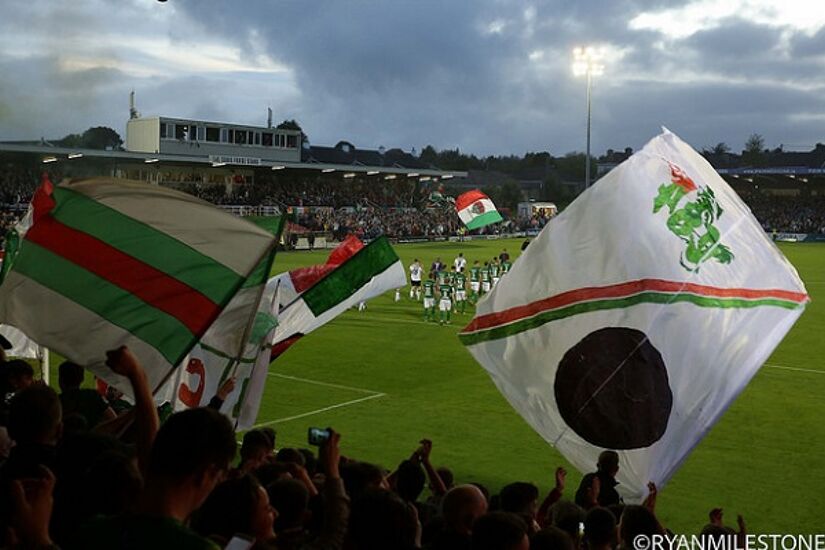Neal Horgan: From Professional Football to a Career in Law

Credit: Michael P Ryan (ETPhotos)
Fourteen years at the one League of Ireland club, two published books and a career in law, makes Neal Horgan stand out from your average domestic footballer. Neal looks back over his Cork City days and more with ExtraTime.ie.
Beginning his senior career with Cork City in 1999, the young defender was fortunate enough to represent Ireland at the 2001 World University Games, in Beijing: “We were part-time and Liam Murphy was manager. Tony Tynan and I were picked to play in it and Liam was generous in allowing us to go ... Lots of League of Ireland players weren’t by their respective managers. I’d spoken to Stephen Napier and Anthony Buckley, who had played in that tournament. They both said it was something not to miss and one of the best experiences they had encountered … That goes for me too because the standard of football was excellent. I think Cork City lost a game or two while we were away, but Liam didn’t hold it against us.”
As someone with a solid third-level education behind him, how did Horgan find a happy medium between studying and football?
“In 2002, I did a one-year diploma in legal studies and could only do it in Dublin ... I lived there while playing for Cork City. Gareth Cronin and I trained with Mick Cooke at Ballyfermot United. Most of our away games were in Dublin at the time, but we had to travel for home matches. Pat Dolan came in 2003, wanted players to go full-time and certainly live in Cork if you were part-time.”
The following season, Neal fractured his leg and missed out on City’s memorable UEFA Intertoto Cup campaign: “It was frustrating, but in fairness to Pat Dolan and Brian Lennox, they brought me and Stephen O’Flynn, who was also injured, on all the away trips – to Nijmegen, Malmo and Nantes. They had to pay for our accommodation and flights ... It’s something that has stayed with me. That run gave us belief of being able to play at a higher level and some did.”
2005 saw the Rebel Army capture the Premier Division, but despite a talented squad, repeating this achievement remained elusive: “I felt that it was the start of winning more leagues. After beating Derry for the title, they were staying in the same hotel where we were celebrating. I spoke with Peter Hutton, who had won the league before and he said to enjoy it now because you might feel you’re going to win it every year, but it doesn’t come around that often and how right he was.”
Born in San Francisco, Horgan never took advantage of his US citizenship to combine college and a playing career on the other side of the Atlantic: “I made an effort to go to the States in 2007. I went to Colorado Rapids and spent a month in Mexico, which didn’t lead to a contract. I was in contact with Damien Richardson, our manager at Cork. I was negotiating in Mexico City, on the phone with Damien and we came to an agreement. When Danny Murphy went to Motherwell, in Scotland, he spoke to me about also moving. After my heart was set on America, I was happy to stay with City, which worked out nicely and I got two books out of it as well (laughs). Winning trophies with Cork means more to me than trips abroad.”
Those trophies included that year’s FAI Cup and the following season’s Setanta Sports Cup, but the aforementioned books: Death of a Football Club? and Second City, are a record of the right-back’s tumultuous 2008 and 2009 campaigns with his hometown side: “Those stories had to be told. I wanted to document what happened with Cork City … To show people that if full-time football had been organised properly here, it had huge potential for the game. If planned from the FAI down, other than by individual clubs and chairmen, it could have massive benefits. We needed greater guidance from the FAI, but to date we haven’t. Between the first and second books, the Conroy Report came out, which I felt didn’t address a lot of issues.”
Departing City in 2009, Neal briefly turned out for Munster Senior League outfit Douglas Hall before reappearing at Turners Cross the next year: “When I left Cork, I was going to complete my solicitor training. Doing the Blackhall exams, you have five years after passing to take up a training contract with a firm. In 2009, the club was full-time and that wouldn’t work. I was getting sick of the financial insecurities and needed to move on with my career. FORAS took over and started in the First Division. Tommy Dunne came in as manager and asked me if I had an interest in going back. I’d taken the professional Irish players’ retirement tax relief and one of the conditions of that is you can’t ever get paid in your sport again. I returned as a volunteer because I owed the club and had great times there. One other prerequisite was that I’d gone back to St Finbarr’s GAA club and had to give them priority ... No strings attached or worries about not getting paid.”
Horgan’s second stint lasted until 2014 and insists that 2011’s dramatic First Division win at Shelbourne’s expense remains one of his fondest memories: “A draw would have been enough to be promoted. Shelbourne were already up, but we had to keep it at 1-1. We weren’t thinking about winning the league, just promotion. Normally, if you’re hanging on, your goalkeeper would kick the ball long, but we played out from the back in our final attack. Derek O’Brien put in a fantastic cross for Graham Cummins to score the winner. What made it extra special was that the fans had taken over and it was just rewards for their painstaking efforts and faith in the football club.”

